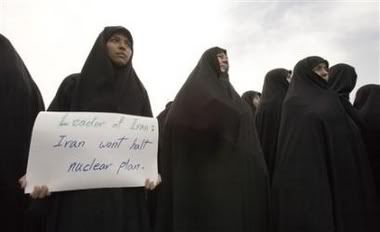Ruskies Violate Iran Sanctions
 Useless Nincompoops. Maybe that's what the "U" and the "N" stand for.
Useless Nincompoops. Maybe that's what the "U" and the "N" stand for.After a couple years of working on it under intense pressure from the U.S., led primarily by John Bolton, prominent Dem target-boy, the U.N. passed sanctions on Iran -- not the sanctions we needed, but something ... something like "straining mightily to pass a flea."
One of the points of the sanctions were international travel restrictions on 15 key Iranian officials tied to the nuke program. The idea was to recognize that it was simply too dangerous to let these 15 go anywhere, because their only reason for traveling would be to make nuke deals and acquire nuke technology and raw materials.
Good idea. But.
Today, amidst the news of Iran supposedly gaining large-scale ("industrial") fuel enrichment capability, we learn this:
Iranian state television reported Monday that an Iranian Revolutionary Guard general who is banned from traveling abroad under the sanctions has visited Russia without any difficulty.
Gen. Mohammad Baqer Zolqadr, who is also deputy interior minister for security affairs, was quoted on the state TV Web site as saying that his six-day journey to Moscow, which ended Monday, showed "the ineffectiveness of the resolution."
The resolution calls on all governments to ban visits by the 15 individuals and says that should such visits occur — presumably for exceptional circumstances — the countries should notify a U.N. committee.
Let's see: "calls on all governments to ban...." And the Russians voted for the resolution, so it should be clear as yellowcake; no visits to Russia for guys like Zolqadr. But diplomacy and Russian foreign affairs are anything but clear.
Russian Foreign Ministry spokesman Andrei Krivtsov confirmed that Zolqadr visited Russia. He told The Associated Press that the resolution does not prohibit visits by the listed individuals, but calls for heightened vigilance "directed first of all at people who are directly related to nuclear programs" — suggesting that Zolqadr was not.If Krivtsov's comment is accurate, then why did the Russians approve sanctions that included a specific ban on Zolqadr's travel?
Even if Zolqadr isn't involved directly in the nuke program, he is a strident and nasty foe of U.S. operations in Afghanistan and Iraq, as witnessed by comments like this:
Zolqadr also said that the U.S. forces pursue “important and strategic goals in their continuing occupation of Iraq”.
The U.S. wanted to remain in Iraq to “plunder the country’s wealth, bring the Middle East under its control, and create security for Israel, which is on the verge of annihilation”.
Based on those comments, some intelligence analysts have concluded that Zolqadr's role is to plan for a larger Iran-US confrontation with the US:
Judged on the basis of Brigadier Zolqadr's comments and other reports from sources in the Gulf, Iran believes it will eventually become a target for US military action and is busily dispersing and hardening command, control and other important elements of its defence infrastructure. Iran has also embarked on a major upgrading of its air defence systems with considerable help from the Chinese and possibly the Yugoslavs, in an attempt to develop a reasonably effective anti-Stealth defence capability. Iranian defence analysts have tried hard to learn the lessons of the successful US campaigns in Iraq, Kosovo and Afghanistan. They can expect the full support of Russia, despite the apparent warming of relations between Moscow and the West, and indeed supplies of advanced Russians weapons have increased markedly in recent months.So what was Zolqadr doing in Russia?
One could argue that he was there to acquire what Iran needs for the legitimate defense of its nation against the US aggressor. But you can turn that another way: He was there to build a defense against international operations to remove Iran's nuclear capability.
That's why his foreign travel is banned; that's why Russia is clearly in violation of UN sanctions for allowing the trip.
Will there be repercussions? Who cares? Do you think it will bother Russia if a movement begins on the East River to express concern about the Zolqadr trip? Of course not. They're on the Security Council, with veto power.
Labels: Foreign policy, Iran, U.N.




<< Home